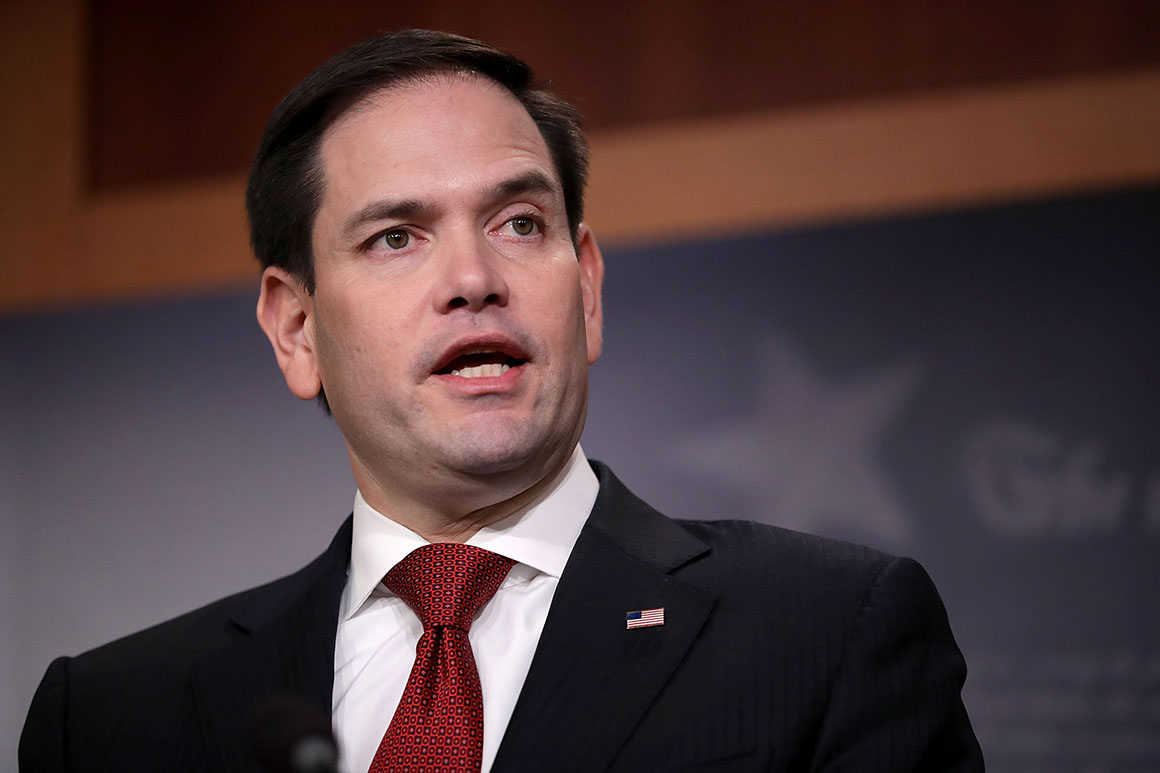
Rubio has become less overt in his pursuit of the White House. He once charted out his political future step by step: from state legislator to insurgent senator to president.
But after losing to Trump and running for reelection to the Senate in 2016, he said he’s better than he „used to be at sort of living in the moment and sort of dealing with what’s before“ him.
What was in front of him in mid-March was what he saw as a flawed “Phase Two” coronavirus-response bill from the House that put too much of the onus on small businesses to provide paid leave to workers, despite Democrats wanting something even more ambitious. As he and Sens. Susan Collins (R-Maine) and Lamar Alexander (R-Tenn.) pored over the legislation during a mid-March weekend, Rubio and his colleagues decided the Senate would need to stay in session and produce its own sweeping response to the virus.
Rubio said his committee began drafting small business language in February, though it had no concept then of the scale of its mission. Still, he credits that groundwork with allowing the Senate to get its bill together quickly enough to pass it in the teeth of the crisis the following month.
The small business initiative got off to an uneven start, however, as some banks struggled to offer loans under guidelines that were rushed out by the Treasury Department. But Congress is already beginning to plan its next coronavirus legislation, and Rubio will once again play a leading role. Trump tweeted Saturday that he will „immediately ask Congress for more money to support small businesses“ if funding runs out.
A former state house speaker, Rubio cultivated the reputation of a policy wonk by spending years developing a legislative portfolio before running for president only to see Trump’s slash-and-burn style sideline him in 2016. Still, there are some similarities: Each man runs his own Twitter account and dishes out media criticism readily — though Rubio’s come with a side of Bible verses.
Rubio has largely shied away from conflict with Trump over the past four years after trading school-yard insults with him on the campaign trail. Rubio has mostly backed the president’s agenda, though he opposed Trump’s national emergency to fund a southern border wall and voted for sanctions against Russia that Trump had resisted. At the same time, he’s not among the senators on Trump’s speed dial or those constantly jockeying to be in the president’s good graces.
Whether a Republican can rise in the coming years without enthusiastically embracing Trump or Trumpism may determine Rubio’s future in the party.
For now, amid the coronavirus crisis, Rubio finds himself in a potent spot in part because of his deferential attitude to more senior senators. When former Foreign Relations Chairman Bob Corker (R-Tenn.) announced his plans to retire in 2018, Rubio quickly endorsed Sen. Jim Risch (R-Idaho) to lead the influential panel rather than launch a potentially bitter intraparty challenge. Instead, he took the Small Business Committee, a relative backwater in the Senate.
And though that’s a panel generally free of the rancor that defines the polarized Senate, even there Rubio has flashed his brand of sharp-elbowed politics. He postponed what should have been a popular bipartisan small business bill in 2019 after Democrats resisted deregulation efforts.
“There was a real impasse between Chairman Rubio and ranking member Cardin,” said Sen. Chris Coons (D-Del.), a committee member who also has worked with Rubio on the Foreign Relations Committee. “That ground us to a halt.”
Moreover, Rubio is not exactly a Senate deal-maker by default. He’s stayed away from any sort of comprehensive immigration reform push since the 2013 bill he co-wrote passed the Senate only to die in the House. It simply doesn’t work, he’s warned his colleagues.
“Gang of Eight was pre-Trump. I … don’t think that he’s going to be in the lead on proposing comprehensive immigration reform,” said Sen. Mazie Hirono (D-Hawaii), who has teamed up with Rubio on issues like saving coral reefs.
Rubio also occasionally deployed more hard-line tactics in the Senate, like when he and Cotton used procedural tools in 2015 to push for tough amendment votes on a high-profile bill allowing Congress to weigh in on a nuclear deal with Iran.
But the novel coronavirus has brought out a more sober side of the onetime tea party upstart. Rubio was one of the first senators to publicly acknowledge the chamber needed to stay in Washington until it passed a rescue package because coming back might not be an option any time soon.
“We really don’t have time to argue about this, we gotta act because we don’t know how much longer we can meet,” Rubio recalled thinking. “We all realized that we were one outbreak from the Senate closing down and not being able to pass this bill.”
Source: politico.com
See more here: news365.stream






